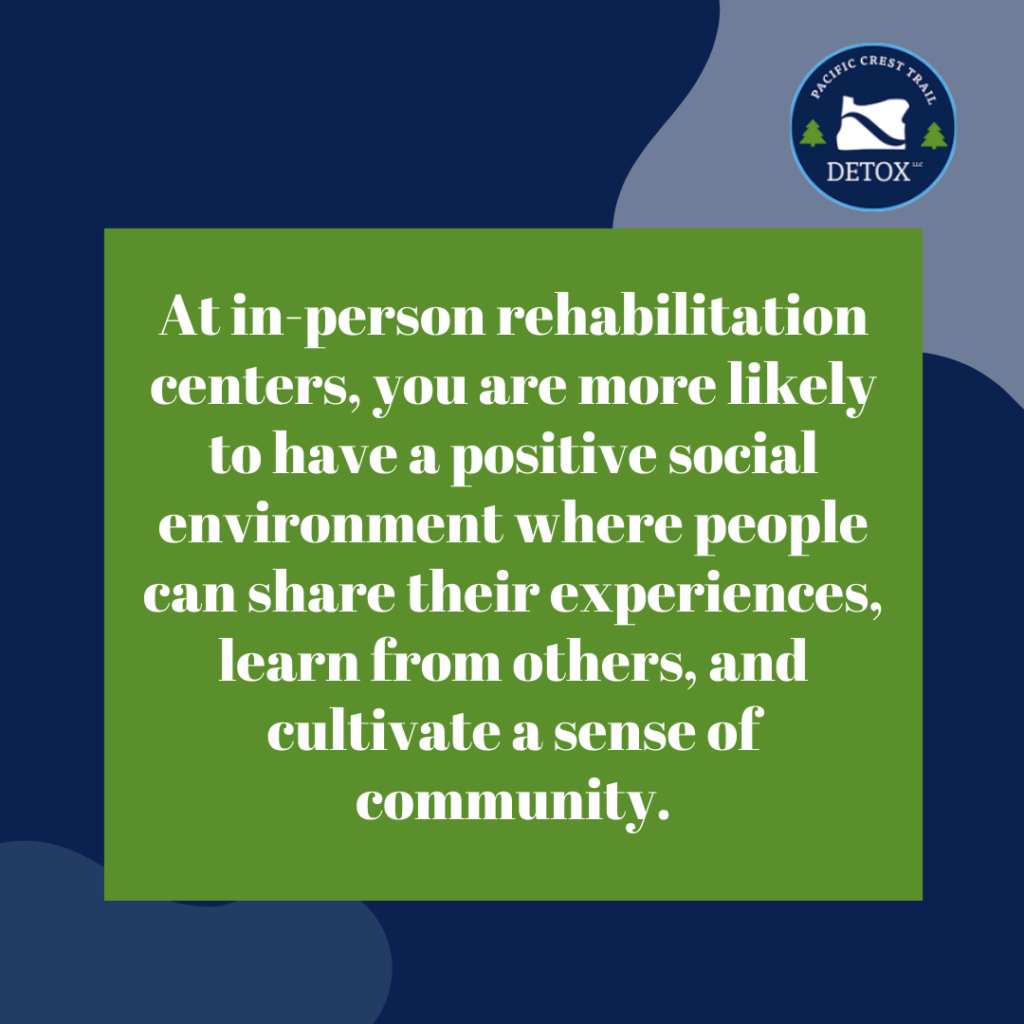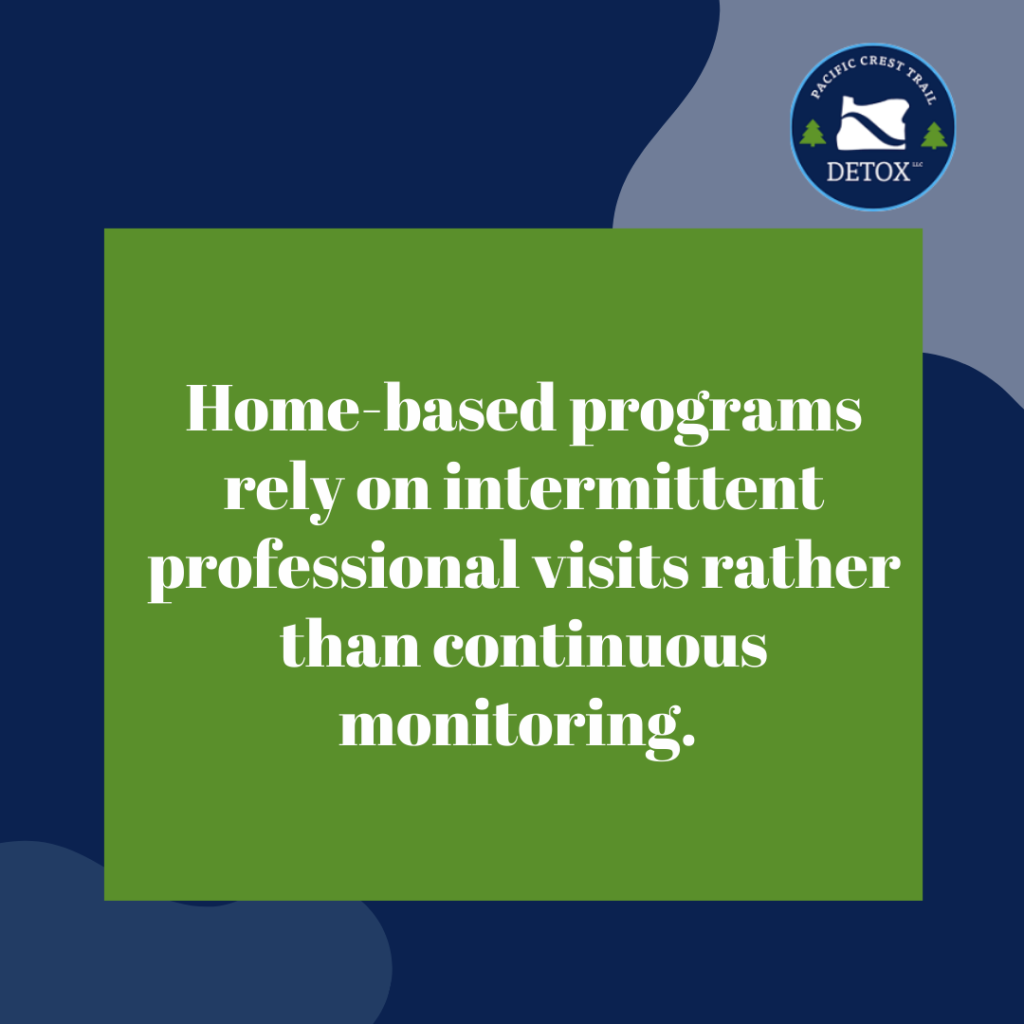Treatment options for addiction range from inpatient programs to at-home treatment, making recovery more flexible than ever. However, there are many questions regarding the safety of at-home treatment methods. Here, we’ll explore the concerns surrounding home-based addiction treatments and alternative methods that may be better for you.

The Pros and Cons of Home-Based Addiction Treatment
There are some advantages to home-based addiction treatment or at-home detox. Many people opt for this type of treatment because of its comfort and convenience. Rehabilitation centers isolate you from your normal activities, but home-based addiction treatment allows you to carry on with your routine comfortably at home.
Home-based treatment also gives you more privacy since you receive therapy and medications at home.
However, there are many more disadvantages to choosing home-based addiction treatment. One of the cons is you may still be in an environment with triggers and distractions that may exacerbate your healing journey. People, surroundings, or circumstances may prompt certain triggers that make it difficult to recover from addiction.
At home, there may also be a lack of social interaction as friends and family cannot constantly be present. One of the fundamental aspects of recovery from addiction is positive social interaction. At in-person rehabilitation centers, you are more likely to have a positive social environment where people can share their experiences, learn from others, and cultivate a sense of community.
There are usually more customized treatment options at rehabilitation facilities. For instance, some centers specialize in alcoholism, while others focus on specific age groups or genders. You may need that specialization to be most successful in your life of sobriety.
Home-based addiction treatments may also be lacking in access to therapeutic activities. At home, you won’t be able to attend group therapy, exercise with others, or share your creative pursuits, all of which are part of holistic wellness.
Home environments do not have much of the structure and routine found in inpatient rehab settings. Without the accountability provided by this structure and routine, individuals may struggle to stay committed to their treatment plans, leading to a higher risk of relapse.
There is also a lack of continuous professional monitoring, which can be crucial for people with severe addiction issues or co-occurring mental health disorders.
Lastly, while at-home treatment may be more comfortable initially, maintaining boundaries between personal life and the commitment to recovery can be challenging in that setting. This may lead to difficulties in prioritizing treatment and self-care.
Home-based Treatment vs. Inpatient Rehab
Home-based addiction treatment and inpatient rehab are two distinct approaches to addressing substance abuse and addiction. Here are some key differences between the two:
Setting. Home-based treatment takes place in your home or a familiar environment, while inpatient rehabilitation occurs in a residential facility designed explicitly for addiction treatment.
At home, you have more flexibility but may lack a structured environment and 24/7 supervision. The benefit of a rehabilitation center is that it has a highly-structured environment with constant supervision to support recovery.
Treatment and Support Services. Home-based programs often involve less intensive treatments compared to inpatient rehab, which usually has more focused and immersive treatment experiences as well as a wide range of support services. These include medical, psychological, and peer support within the facility.
Treatment duration can vary at home and you have more control of the pace, while inpatient rehab has a fixed duration ranging from weeks to several months.
Peer Interaction. At-home addiction treatment has limited opportunities for structured peer interaction and group therapy. Inpatient rehabilitation offers a supportive community with group therapy sessions and shared experiences among residents.

Professional Monitoring. Home-based programs rely on intermittent professional visits rather than continuous monitoring. Inpatient rehab, on the other hand, involves constant professional monitoring. This ensures immediate response to any urgent issues.
Choosing between home-based treatment and inpatient rehab depends on individual factors such as the severity of addiction, the presence of co-occurring disorders, the level of support at home, and the individual’s commitment to treatment. In many cases, however, the inpatient or even outpatient approach is recommended to fully address addiction effectively.
The Importance of Professional Supervision
The importance of managing withdrawal symptoms in addiction recovery is essential, so choosing the right treatment is necessary.
In any treatment, the supervision of a professional is vital. The healing journey is not a one-size-fits-all approach for all patients. Clinical supervision should be tailor-fit to your recovery needs and situation-specific changes.
Supervised sessions in rehabilitation centers will allow you to experience the benefits of professional detox, such as having a supportive environment to cope with emotional challenges, a structured daily schedule, and access to support groups and therapies that address the root cause of your addiction.
Such professionals will also help you explore coping mechanisms to deal with your triggers and underlying issues. Throughout the process, you’ll receive guidance from trained clinicians who understand the intricacies of addiction.
Aside from a supportive environment, detoxing, and working on coping mechanisms, professional supervision also allows patients to tackle co-occurring mental health issues. Underlying mental health conditions often accompany addiction, and these require specialized attention for full recovery.
Without an integrated approach guided by a professional, you may struggle to find the root cause of addiction, which can hinder your ability to maintain sobriety.
Professionals help patients reach their sobriety goals. Supervision ensures you are on track with your recovery by implementing check-ins and monitoring. This holds you accountable consistently so you become more responsible for your actions and progress.
Ultimately, tailored guidance is vital to a person’s recovery and well-being. Without it, attempts at recovery may be unsuccessful, potentially leading to further substance abuse or other health risks.
The Bottom Line
With so many things being done from home these days, it’s not a surprise that more and more people who are battling addiction are choosing to have home-based addiction treatments.
However, studies show that intensive outpatient and inpatient programs are most effective at treating substance use and addiction. There are also several risks or disadvantages in a home-based addiction treatment approach, including being around triggers and a lack of support. This makes professional detox programs better suited for people wishing to achieve sobriety.
At Pacific Crest Trail Detox, you’ll find a Portland detox program that aims to tailor treatment to each individual’s full range of recovery needs.


